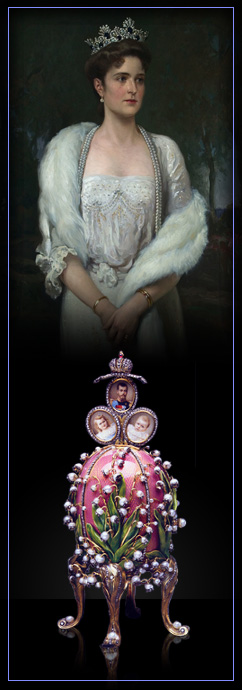Bob Atchison's guide to rare and antique roses and where to buy them with special focus on David Austin Roses and Antique Rose Emporium


 Chapter XXVRasputin's Murder - Last Days of Sovereignty, December 1916 to March 1917 The story of the murder has been so often told that there is no need to repeat it. It is enough to say that Rasputin was first offered poisoned wine, the amateur murderers not knowing that for the poison they chose alcohol is an antidote. Their victim survived what appeared to be a deadly dose. Prince Yussupov and Purishkevich then took the Staretz into an adjoining room and, as he was admiring an ancient crucifix, shot him several times in the back. Rasputin's strong frame resisted even this, and when Prince Yussupov -returned to remove his body, he got up and staggered across the room. More shots were fired, this time with effect. The body was taken in a car and thrown into a hole made in the frozen Neva. The strength of the current drove the body down under the ice, and it was washed ashore some days later. The Staretz does not seem to have been dead even when he was thrown into the water, for the cords bound round his body were loosened, and his rigid hand was folded as if making the sign of the cross. When the police came to Prince Yussupov's house to ask about the firing at dead of night, they were told that a dog had been shot. The authors of the murder lay low at the time; some even denied any knowledge of it. In spite of the Censor, however, the story of the Staretz's disappearance got almost immediately into the Press, and caused a tremendous sensation. Though patriotic feeling was supposed to have been the motive of the murder, it was the first indirect blow at the Emperor's authority, the first spark of insurrection. In short, it was the application of lynch law, the taking of law and judgment forcibly into private hands. No inquest was ordered, on account of the personalities involved. An Imperial order forbade any legal procedure, and the murderers of the Staretz, went unpunished. Both Prince Yussupov and the Grand Duke Dmitri Pavlovich were, however, exiled by the Emperor, the first to one of his properties, the second to the Caucasian front. The whole Imperial Family signed a petition to the Emperor, asking leave for the Grand Duke to stay in Petrograd on account of his health, but the Emperor refused, making a marginal note on the petition that "no one had the right to commit murder." After the first horror-stricken moment of the news of Rasputin's disappearance, the Empress showed her usual spirit. She was holding a reception of ladies, and between the audiences Mine. Vyrubova managed to tell her what had happened. I knew nothing, and went to Her Majesty to tell her that there was still a lady to be received. I heard the door close on Mme. Vyrubova, and found the Empress outwardly perfectly calm. I told her that Mme. Vera Narishkin (née Witte) was waiting, and Her Majesty told me to bring her in. Mine. Narishkin had come to talk to the Empress about a workshop for disabled soldiers, and she notes in her reminiscences the deep interest that the Empress took in her work, and the detailed knowledge which she displayed of the subject: The body of the Staretz was recovered and buried in a piece of ground at Tsarskoe Selo on which Mine. Vyrubova meant to build a chapel for a home for disabled soldiers. The Emperor, Empress and their daughters, Mme. Vyrubova and Father Alexander, their confessor, went early in the morning to the funeral. Then the Empress nerved herself to attend the usual numerous Christmas trees for the servants, the escort, and the hospitals, and when Protopopov came to report an alleged plot to murder Her Majesty, she was perfectly cool and calm. She asked me if I were afraid to drive with her, and this, of course, I energetically denied, but I noticed after this that she seldom took either Countess Hendrikov or myself. Her greatest fears were for Mme. Vyrubova, who was almost as much execrated by the public as was Rasputin himself, and the Empress made her move into the Palace -for greater safety. But the underlying reason for the unpopularity of Mme. Vyrubova had now ceased to exist, for she could no longer form the link between the Empress and Rasputin, which had been one of the chief allegations made against her. Threatening letters now began to pour in on the Empress herself. She felt sad and tired. In her letters to her intimates she signed herself "an old woman, " and her anxiety for Mme. Vyrubova is shown in a letter to Countess Anastasia (Nastinka) Hendrikov in which she says: " Besides everything, try for a moment to realize what it is to know a friend in daily, hourly danger of also being foully murdered. But God is all mercy . . .Rasputin's death had been a shattering blow to the Empress. She had pinned all her faith on him as the saviour of her child. With Rasputin at hand she had been at rest about her boy, whose days she now felt were numbered. Then, too, the Staretz had said "When I go, you shall go also " predicting the fall of the Empire. What would happen now? Shortly before the New Year the Emperor left again for Headquarters. The Empress was too dispirited and unwell to attend even the customary New Year Te Deum, sung at midnight on the 3 1 st of December in the private chapel of the Alexander Palace. The food and fuel shortage was increasing every month in Petrograd. The measures taken by Protopopov were insufficient, and long queues of people stood every day for hours in front of the bakers' shops. The Empress was still confident about the political situation, thinking it was only a passing crisis, and that in a couple of weeks, when the food transport was in working order, all would be well. At the end of November 1916 Prince Vladimir Mikhailovich Volkhonsky, the late Vice-President of the Duma, told me that the mismanagement of the food transport was such that by the middle of February the population of Petrograd would be without flour, and that we should have famine riots in the capital which, in the alarming state of the country, might imperil the safety of the throne. Prince Volkhonsky wanted to see the Empress and warn her of the danger, and I gave Her Majesty his message. The Empress liked Prince Volkhonsky personally. He had been a playfellow of the Emperor in childhood, and had worked with the Grand Duchess Olga Nicholaevna on one of her charity committees. The Prince was, however, at that time UnderSecretary to the Ministry of the Interior under Protopopov, and the Empress thought it would be disloyal, and savouring of intrigue on her part, to listen to the complaints of the second-in command "behind the chief's back," so Volkhonsky was never received. The Emperor had contemplated forming a "Ministry of National Confidence" in January 1917, but in consequence of the great state of ferment the country was in, the plan had, been postponed. The year began in an atmosphere of anxiety and gloom. The Emperor returned to Tsarskoe Selo shortly after the New Year, and remained in the Palace until March 8th. He was anxious and worried. Ministers came and went. All the audiences which had been postponed and all the business that had been held over were now dealt with. Physically, the Emperor had changed much. He looked worn and pale, and had grown extremely thin. His kind eyes had a constant look of worry and sadness ; there were deep lines on his forehead, and a suspicious bagginess under his eyes, which suggested heart weakness. His presence was a great comfort to the Empress. Mme. Vyrubova and Mme. Lily Dehn were also even more than usual with her now. Mme. Vyrubova was living in the Alexander Palace and gave three small musical parties in her rooms for the young Grand Duchesses, to which the Emperor and Empress came. She invited her usual circle: Mme. Dehn, Countess Emma Freedericsz, with her sister, Mme. Voyeikov, a few girls, and some officers of the Standart who were on leave, also Prince Dolgorukov, Duke Alexander Leuchtenberg, and myself. A Rumanian band played, but though the Grand Duchesses enjoyed thisimgy of thei lives, there was no gaiety in these entertainments. They were weighed down by the gloom of coming events, and all the songs seemed to strike the saddest notes. I distinctly remember the anxious look on the Emperor's face, and the deadly sadness in the Empress's eyes. Events were now so threatening in the capital that the Emperor decided to stay at Tsarskoe Selo, and give all his attention to home affairs. He felt that the disaffection in the rear was seriously beginning to endanger the prospects at the front. To win the war was his sole thought day and night, for he knew that on its outcome lay Russia's future as a Great Power. The Emperor's fidelity to his Allies has never been even questioned. He put faith in the great advance that had been planned for the spring, both in Russia and in France. All through this winter the Russian armies were preparing, and were being reorganized and reformed. It was in connection with this reorganization that the Emperor was persuaded, against his will, to return to Headquarters on March 8th. It was only after an urgent telegram from General Alekseyev that he decided to go, and then he started with the intention of staying only eight days. I happened to be with the Empress on business when the Emperor came in with General Alekseyev's telegram in his hand. He told me to stay, saying to the Empress: "General Alekseyev insists on my coming. I cannot really imagine what can have happened to make my presence at Headquarters so urgently necessary now. I shall have to go and see myself. I am determined to stay only a week at the utmost, for I must be here." Was it a plot? God knows! The Revolution broke out during those eight days. Had the Emperor been at Tsarskoe Selo, and had Rodzianko been in direct communication with him, the Emperor would have had the whole machinery of government in his hands. The Revolution, which was at first only a local Petrograd rising, might have been stamped out and all the subsequent tragedies averted. After the Emperor's departure the Tsarevich and the Grand Duchess Olga Nicholaevna fell ill with measles, caught from one of the Tsarevich's friends, who had been spending the week-end at the Palace. The Empress held diplomatic receptions on March 9th and March 10th, warning all those who might have been afraid of infection; it was the first time for many years that she had received the Diplomatic Corps. Her health had for long prevented her from accompanying the Emperor to the New Year' receptions, and often foreign Ministers came and went without ever seeing the Empress. This year she felt stronger, as she had not tired herself so much in travelling; and she received, in a body, all the Ministers and Secretaries of Foreign Missions whom she had not yet seen. In Petrograd many of the workmen were already on strike. There had been minor riots in consequence of the "queues." The atmosphere was full of thunder. The Danish Minister, M. de Scavenius, said to me, on March 10th, that the situation in the town was very grave. I was alarmed, for in the Palace we had lulled ourselves into believing that no serious rising would take place during the war, and the Emperor's gentlemen confirmed this opinion. The Diplomatic Reception went off with its usual pomp - Masters of Ceremonies, runners in feathered hats, servants in gold-laced liveries, preceding the Diplomatic Corps. The Empress was very gracious to all, and they went away captivated by her charm. This was the last function, for five days later the Empire of Russia was no more! |
|
Alexandra Feodorovna was the last Romanov Empress of Imperial Russia. This online book - The Life and Tragedy of Alexandra Feororvna was written by Countess Sophie Buxhoeveden, Lady-in-Waiting to the Empress, who served the Empress for many years and followed the Imperial family into exile. |

- Early Surroundings
- Childhood
- A Young Princess
- Engagement
- Marriage
- Her New Home
- Coronation
- Journeys
- Charities and Life
- Queen Victoria
- Foreign Trips
- Birth of Alexis
- Gathering Clouds
- On the Standart
- Rasputin
- Her Family
- Empress at Home
- Last Years of Peace
- Wartime 1914
- War Work
- Without the Emperor
- Visits to Headquarters
- Before the Storm
- Warning Voices
- Rasputin's Murder
- Revolution 1917
- Abdication of the Emperor
- Prisoners
- Five Weary Months
- Tobolsk
- Ekaterinburg 1918


 Left: Prince Felix Yussupov.
Left: Prince Felix Yussupov.


